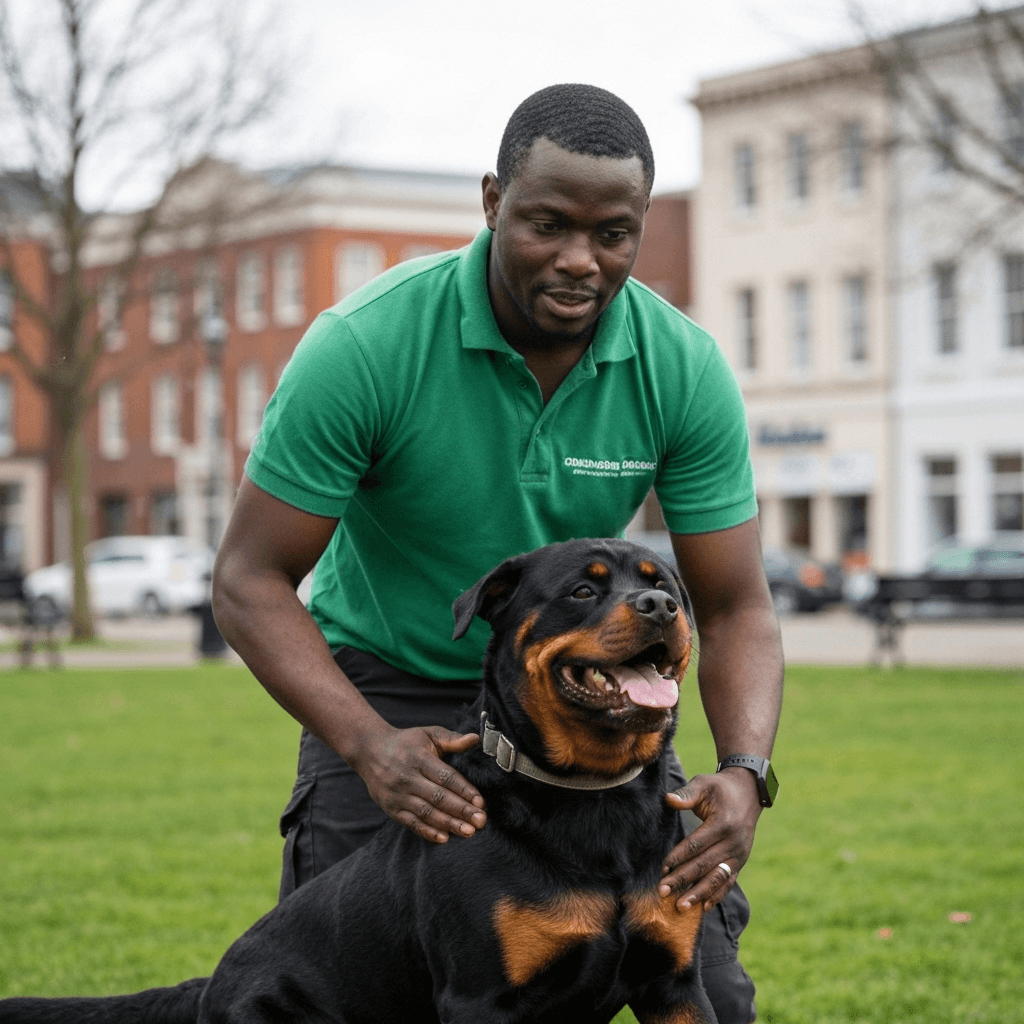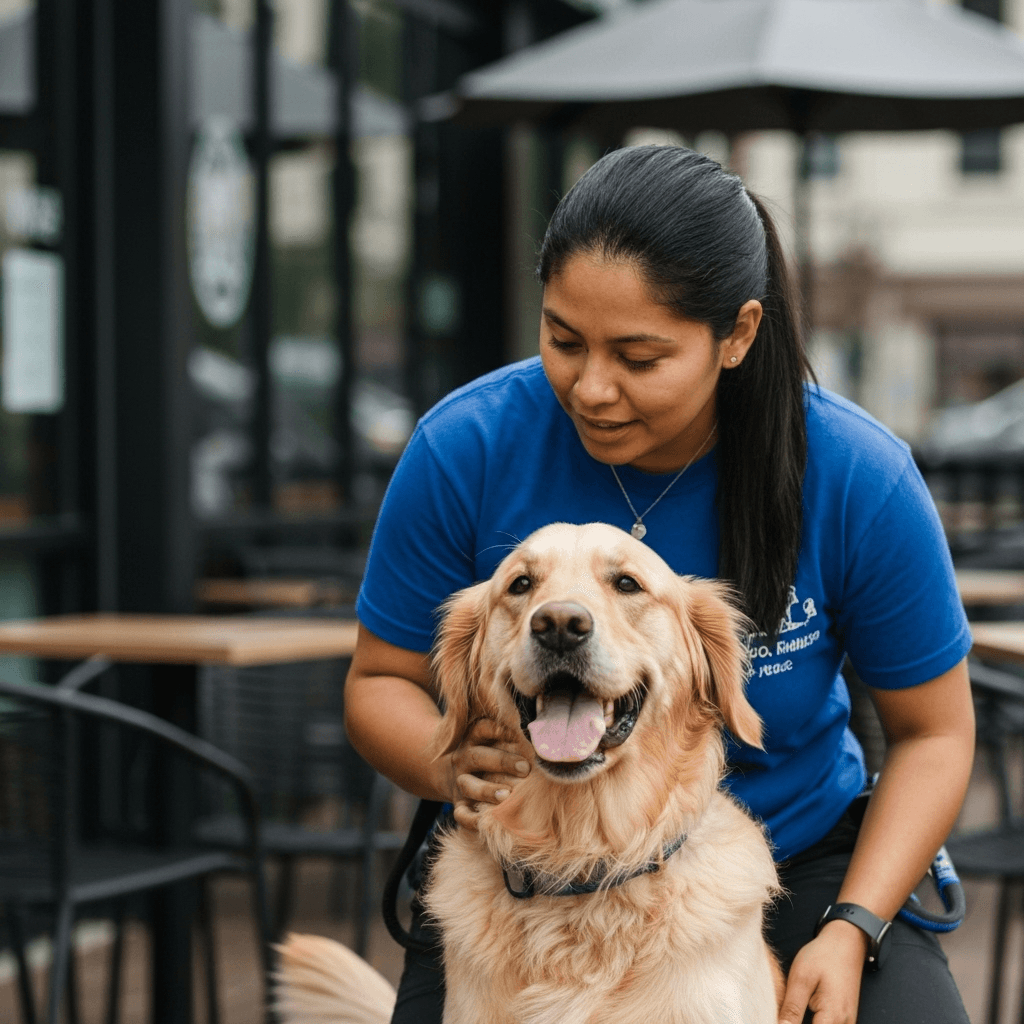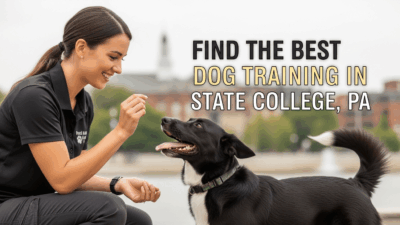Your Complete Guide to Choosing a Dog Trainer in State College
Living with a dog in State College means navigating busy sidewalks around Penn State, dealing with game day crowds near Beaver Stadium, and visiting parks filled with families and other dogs. Good training prepares your pup to handle all of this calmly and safely.
Most local dog rules come from State College Borough and surrounding Centre Region townships. Centre County handles licensing, while Pennsylvania sets rabies requirements. A trainer who understands these local details can help you practice the right skills in the places you’ll actually use them.
How to Choose the Right Trainer
The best training programs use positive reinforcement methods. This approach builds reliable behavior without fear or stress, which is exactly what you need when walking down College Avenue or attending community events with your dog.
When you’re comparing trainers, ask about their credentials. Common certifications include KPA-CTP, CPDT-KA, and science-based programs like CTC. If your dog has serious behavior problems, look for specialists with IAABC-CDBC or CBCC-KA credentials.
In-home training works particularly well for apartment living issues like door manners, elevator behavior, or learning to walk calmly past fraternity houses. Group classes are great once your dog can focus around other dogs, giving you both practice for those crowded park situations.
If you’re considering board and train programs, ask detailed questions about where dogs sleep, how they prevent illness, and most importantly, how they’ll teach you to maintain the training at home. Any facility that keeps dogs overnight for payment must follow Pennsylvania’s kennel regulations through the Bureau of Dog Law Enforcement.
Common Dog Training Methods Explained

Basic obedience covers the essentials: sit, down, stay, recall, and loose leash walking. These skills matter every time you walk downtown or use the multi-use trails around town.
Puppy training focuses on socialization, house training, crate comfort, and leash skills while your pup is still learning. Getting these basics down before your dog encounters game day crowds makes everything easier later.
Behavior modification addresses bigger challenges like reactivity, separation anxiety, resource guarding, or fearfulness. Good trainers use careful, step-by-step plans that keep both your dog and your neighbors comfortable during the process.
You can choose between private lessons for focused work on your specific challenges, or group classes once your dog is ready for controlled distractions. Day training lets a professional work with your dog during the week, then teaches you how to maintain the new skills.
Specialized programs like therapy dog preparation or service dog training require specific criteria, public access skills, and careful documentation of progress.
Average Cost of Dog Training in State College (Updated for 2025)
Training costs in State College and Centre County depend on the trainer’s experience, session length, and location. Here’s what you can expect to pay in 2025:
| Service Type | Average Cost (State College/Centre County) |
|---|---|
| Puppy classes (4–6 weeks) | $140–$260 total |
| Group obedience classes (4–6 weeks) | $150–$275 total |
| Private lessons (60–90 min) | $95–$165 per session |
| In-home coaching packages (4–6 visits) | $420–$820 total |
| Day training (trainer works your dog + handoff) | $450–$850 per week |
| Behavior consult for reactivity/anxiety (initial) | $130–$220 |
| Board and train (2–4 weeks) | $1,900–$3,900 total |
Many trainers charge extra for longer drives across Centre County or evening appointments. Complex behavior cases typically cost more because they require additional planning and safety measures.
Questions to Ask Potential Dog Trainers
When you’re interviewing trainers, these questions will help you find the right fit:
- What training methods do you use, and how do you keep sessions positive and low-stress for dogs?
- What credentials do you hold, such as KPA-CTP, CPDT-KA, or advanced certifications like CPDT-KSA?
- How do you adapt training for State College situations like campus foot traffic, downtown restaurant patios, and weekend events?
- Do you offer in-home sessions, private lessons, group classes, or day training, and which would work best for my goals?
- How do you track progress and decide when my dog is ready for more challenging situations?
- What’s included in your pricing, do you charge travel fees, and what’s your cancellation policy?
- Do you carry liability insurance, and can you provide proof if requested?
- If we train in public parks, do you have the required permits for commercial use?
- For behavior issues, will you work with my veterinarian if needed?
- Do you offer a consultation or evaluation, and what happens during that first meeting?
Local Rules in State College and Surrounding Areas
Understanding local regulations helps you train your dog for real-world success. Here’s what you need to know:
Dogs must be leashed in all public places except designated off-leash dog parks. Keep a standard 6-foot leash handy for sidewalks, trails, and areas near athletic fields.
Pennsylvania requires rabies vaccination for all dogs 3 months and older. You can find current requirements at the Pennsylvania Department of Health rabies information page.
All dogs 3 months and older need a current Centre County dog license. The Bureau of Dog Law Enforcement website explains licensing, kennel rules, and dangerous dog laws.
You’re required to pick up after your dog everywhere, including trails and fields. Most parks have waste stations, but bring backup bags just in case.
Excessive barking can result in nuisance citations, especially important if you live in apartments near campus or downtown. Work on calm confinement skills, mental enrichment, and quiet commands if you’re in close quarters with neighbors.
Professional trainers who board dogs overnight must follow state kennel regulations. Ask how they meet these standards if you’re considering board and train programs.
Some public parks require permits and insurance proof for commercial training sessions. Your trainer should handle these details before meeting you at public locations.
Local State College Resources for Dog Owners
State College offers several great resources for dog training and exercise:
Tudek Dog Park at Tom Tudek Memorial Park in Ferguson Township has separate areas for large and small dogs, with clear rules posted at the entrance.
Oak Hall Regional Dog Park in College Township provides a fenced off-leash area managed by Centre Region Parks and Recreation.
Bald Eagle State Park welcomes leashed dogs on many trails and day-use areas, perfect for practicing polite trail manners and recall training.
The calmer edges of campus offer real-world practice for walking politely past pedestrians, bikes, and scooters. Always check posted signs for current dog policies.
The Centre County Treasurer’s Office handles dog licensing, including lifetime options with microchips. Call ahead to confirm current fees and required paperwork.

Common Questions About Dog Training
How much does in-home dog training cost?
Most State College trainers charge $95–$165 per in-home visit. Multi-session packages usually offer better value, and initial behavior assessments typically cost at the higher end of this range.
Is in-home dog training worth it?
Absolutely. In-home training addresses problems exactly where they happen, whether that’s door jumping in your apartment, hallway reactivity, or yard behavior issues near busy student housing.
Can you pay someone to house train your dog?
Many training programs include house training, crate training, and schedule development. Day training can speed up the process since a professional handles the repetitive practice, then teaches you to maintain the routine.
What is the 3-3-3 rule for dog training?
This guideline suggests dogs need about 3 days to decompress in a new situation, 3 weeks to learn new routines, and 3 months to feel fully settled. Training programs that respect this timeline tend to have fewer setbacks and less stress for everyone.
How long will it take to reach my training goals?
Well-socialized puppies and adult dogs often show solid improvement in 4–8 weeks with consistent daily practice. More serious issues like aggression, reactivity, or separation anxiety typically require several months of careful, gradual work.
What should I bring to group classes?
Pack a flat collar or harness, 6-foot leash, high-value treats, water for your dog, and vaccination records if the trainer requests them. Leave retractable leashes at home for safety reasons.
What’s the leash law in State College?
Dogs must stay leashed and under control in all public areas, except inside designated off-leash dog parks. Keep that standard leash ready for downtown walks and neighborhood strolls.
Do I need a dog license in State College or Centre County?
Yes, Pennsylvania requires county dog licenses for all dogs 3 months and older. You can choose annual licenses or lifetime options through the Centre County Treasurer’s office.
What shots does my dog need in Centre County or Pennsylvania?
Rabies vaccination is required statewide for dogs over 3 months old. Your veterinarian may also recommend distemper-parvo combination vaccines and bordetella based on your dog’s lifestyle and exposure risks.
Are dog trainers required to be licensed in State College or Centre County or Pennsylvania?
No special state license exists for dog trainers. However, training businesses should follow general business regulations, carry liability insurance, and comply with Pennsylvania kennel laws if they board dogs.
Where can I practice off-leash recall?
Use fenced dog parks like Tudek Dog Park or Oak Hall Regional Dog Park for safe off-leash practice. Visit during quieter hours when you’re starting out to keep training sessions calm and manageable.
Which dog parks allow training around State College?
Both Tudek Dog Park and Oak Hall Regional Dog Park allow training inside their fenced areas. Keep your training sessions low-key to share space respectfully, and always follow posted rules.
What beaches or trails allow dogs for training?
While there aren’t ocean beaches nearby, leashed dogs are welcome on many trails at Bald Eagle State Park and Rothrock State Forest. Check posted signs for any seasonal restrictions and stick to marked trails.
Can a trainer meet me on campus or in borough parks?
Often yes, but commercial use may require permits and insurance documentation. Ask your trainer how they handle these requirements before scheduling public location sessions.
Do apartment complexes near campus have special pet rules?
Many rental properties have specific size limits, breed restrictions, or noise policies. Get the written pet policy from your landlord and share it with your trainer so you can create a plan that fits those requirements.
Training your dog with humane methods, real-world practice, and local knowledge creates a calm, well-behaved companion you can take anywhere in State College. When comparing trainers, ask about their methods, experience, and dog trainer certifications to find the best match for your goals.
